Ever walked into a dealership and realized you forgot something important? It’s easy to feel overwhelmed trying to figure out what to bring when buying a car. There’s paperwork, insurance, payments, and a lot of details that can slip your mind. Many buyers end up stressing at the last minute, digging through drawers or calling their bank while standing at the dealership counter.
This blog breaks it all down for you in one simple guide. You’ll learn exactly what to bring when buying a car, why each document matters, and how to make your car-buying experience quick and stress-free. Whether it’s your first time or you just need a refresher, this checklist will make sure you walk into the dealership fully prepared.
Driver’s License
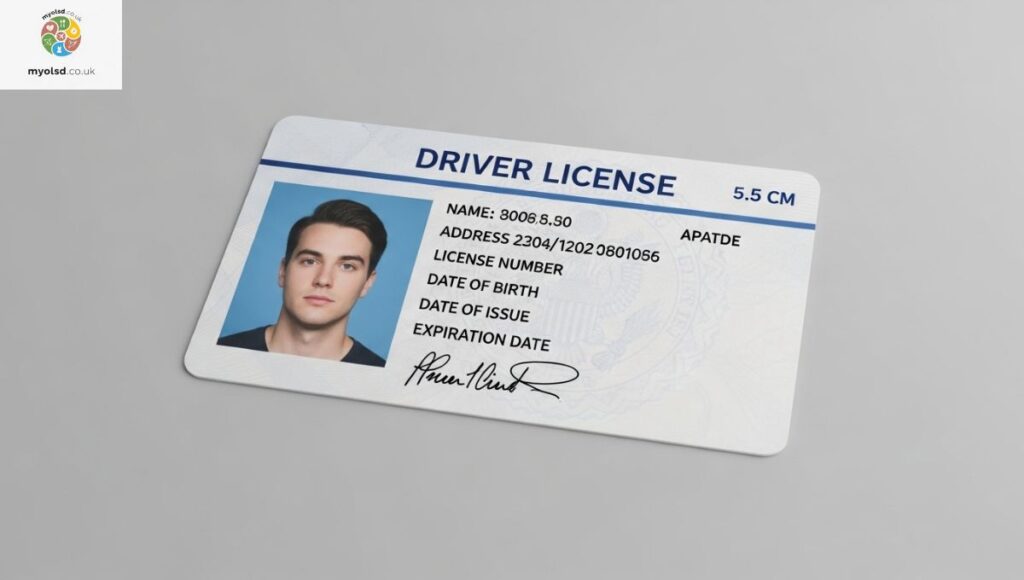
The first and most important item to bring when buying a car is your driver’s license. It’s your primary form of identification and proof that you’re legally allowed to drive. The dealership uses it to verify your identity, match your financing documents, and register the vehicle in your name.
Make sure your license is valid and up to date, especially if you’ve recently moved or changed your name. If you’re trading in a vehicle, the information on your driver’s license should match your current registration and title details to avoid delays. Whether you’re buying at a car dealership or through a private seller, your license is non-negotiable.
Proof of Income
If you’re planning to finance your new car or apply for an auto loan, you’ll need to show proof of income. Lenders require this to confirm that you can afford monthly payments and qualify for financing.
Bring at least two recent pay stubs, a W-2 form, or tax returns if you’re self-employed. Some dealerships may also ask for a bank statement or account number for verification. Having this documentation ready can speed up credit approval and secure a better interest rate. Remember, the clearer your financial picture, the faster your financing approval process.
Proof of Residence
Your proof of residence verifies your address for both financing and registration purposes. Lenders and the DMV require it to ensure your records are accurate. Acceptable documents include a utility bill, lease agreement, or mortgage statement with your name and address clearly printed.
If you’ve recently moved, bring updated paperwork or mail showing your new address. For dealerships like Crossroads Ford Henderson or Toyota World of Newton, this step is essential for processing registration, titling, and any applicable taxes or fees.
Proof of Insurance
Before you can drive off the lot, you must have valid auto insurance. Most dealerships will not allow you to take possession of the vehicle without an insurance policy setup.
If you’re transferring existing coverage, bring your auto insurance card or proof that your current policy is active. If you’re getting new coverage, your insurance provider can email or fax confirmation directly to the dealer. Some sellers even offer temporary insurance or driveaway insurance, giving you time to arrange full coverage later. Either way, don’t skip this it’s a legal requirement and protects both you and your new investment.
Read more Article: Why Do My Teeth Hurt When I Run?
Title for Trade-In
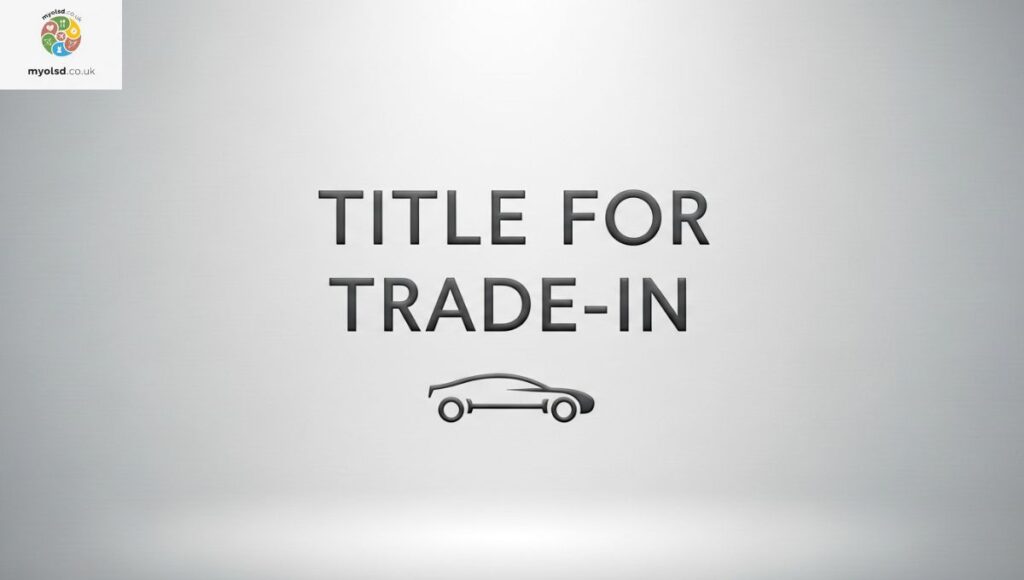
If you’re planning a trade-in, bring the vehicle title (or lienholder information if you still owe money on it). You’ll also need the current registration, service records, and spare keys.
The dealership uses this information to calculate your trade-in value and verify car ownership. If you’ve misplaced the title, contact your lender or local DMV to request a duplicate before visiting. Having all trade-in documentation organized can make a huge difference in how smoothly your transaction goes.
Make an Inquiry
If you’re unsure about certain requirements, always contact the dealership before your visit. Ask about dealership paperwork, financing documents, and any deal-specific requirements that may apply to your location or lender.
Some dealerships, especially brand-specific ones like Ford Motor Credit or Toyota Financial Services, may have unique steps for financing approval or down payment verification. Getting clarity beforehand saves time and ensures you bring everything needed to finalize your purchase the same day.
Hours
Most dealerships operate during standard business hours, but always confirm before visiting. Some, like Toyota World of Newton or Crossroads Ford Henderson, may offer extended evening or weekend hours for buyers’ convenience.
Scheduling your visit early in the day allows enough time for test drives, financing paperwork, and registration processing. It’s also a great way to avoid peak traffic and get personalized attention from sales and finance staff.
Contact
Before heading out, double-check your appointment details and sales contact information. If you’ve been speaking with a salesperson, bring their business card, email correspondence, or appointment confirmation.
This helps ensure smooth communication, especially if you’re applying for outside financing or bringing a pre-approval letter from your bank or credit union. Having a direct contact can also speed up your dealership submission and prevent misunderstandings.
Get an Additional $500 on Any Trade-In!
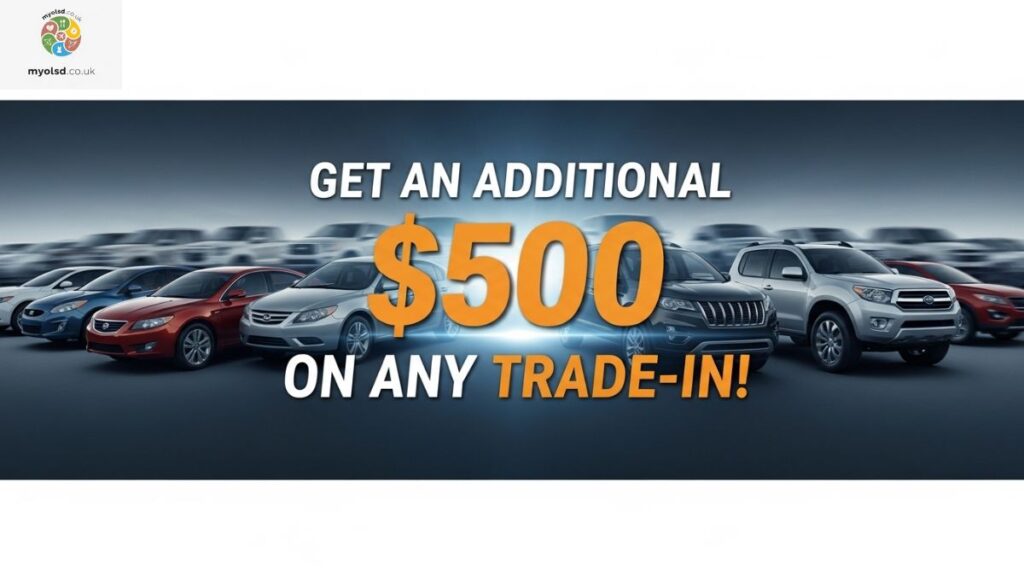
Some dealerships offer trade-in incentives or promotional deals. For example, buyers may get an extra $500 on any trade-in if they meet specific conditions, such as trading a 2018 or newer vehicle or financing through the dealership’s preferred lender.
Always read the fine print eligibility often depends on credit qualifications, residency, and the age of your vehicle. Ask your dealership’s finance center or sales manager to confirm whether you qualify before you visit.
What Newton Drivers Need to Bring
If you’re buying from Toyota World of Newton, here’s a quick recap of what to bring when buying a car:
- Valid driver’s license
- Proof of income and residence
- Auto insurance documentation
- Payment method or financing approval
- Vehicle title for any trade-in
Newton dealerships often assist with vehicle registration and tax paperwork, so having your identification and payment verification ready helps finalize your purchase faster.
Find Your Next Ride at Toyota World of Newton
Once your documents are ready, the fun begins choosing your next car. Toyota World of Newton offers a wide selection of new Toyota models and used cars, with financing options for every budget.
From the moment you step inside, you’ll get help with budget planning, trade-in appraisal, and auto financing. Their team ensures your car buying process is transparent and stress-free, whether you’re buying your first car or upgrading to a new model.
Toyota World of Newton
As a trusted car dealership, Toyota World of Newton streamlines every step of the purchase. They handle dealership paperwork, insurance transfer, and vehicle registration directly with local authorities.
This means you can focus on what matters most finding the right car, test-driving your top choices, and signing the final documents with confidence. Buying a car doesn’t have to be complicated when you know exactly what to bring and who to talk to.
Read more Article: Why Do My Teeth Hurt When I Run?
What Do I Need to Purchase a Car from a Dealership?

When you ask yourself what do I need to purchase a car from a dealership?, the answer depends on how you’re paying. If you’re financing, bring income verification, residence proof, and banking information. If you’re paying cash, carry a certified check, photo ID, and insurance proof.
Dealerships also handle DMV title transfer, temporary tags, and sales tax collection on your behalf. So, being prepared means fewer trips back and forth and more time enjoying your new vehicle.
North Carolina Buyers: What to Expect
For North Carolina buyers, Crossroads Ford Henderson simplifies the titling and registration process by submitting paperwork directly to the North Carolina DMV. They’ll collect your taxes and fees, issue a temporary tag, and mail your permanent title once processed.
If you’re moving from another state, you might need extra documentation such as proof of NC residency or an emissions inspection. Bringing these in advance ensures a quick and smooth handover.
Come Prepared, Drive Home Happy
Showing up with the right documents proves you’re serious and ready to buy. It not only speeds up the dealership process but also helps you secure better financing terms and avoid last-minute stress.
Whether you’re eyeing a Ford Bronco, Toyota Camry, or a used SUV, your preparation makes all the difference. So, grab your checklist, double-check your documents, and head to the dealership confident you know exactly what to bring when buying a car.
Get a Free Valuation
Before finalizing your deal, consider using a trade-in calculator or requesting a free car valuation online. Sites like WeBuyAnyCar or Crossroads Ford can give you an accurate estimate of your vehicle’s worth before you arrive.
Knowing your trade-in value upfront helps with budget planning and prevents undervaluation during negotiations. It’s a smart move every buyer should make.
Documents You Need as a Car Buyer
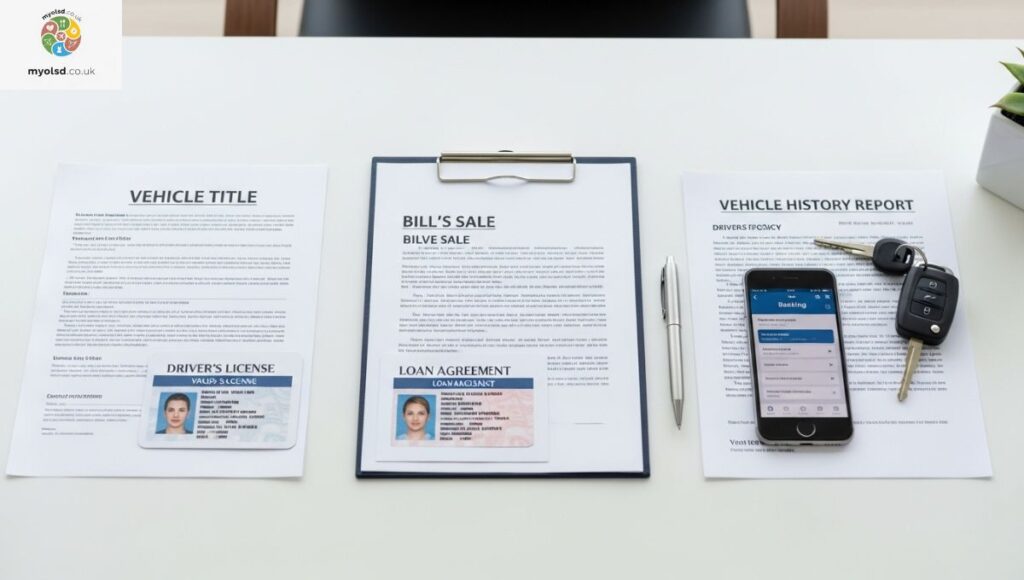
Here’s a summarized car buyer checklist for quick reference:
- Driver’s license
- Proof of income (pay stubs, W-2, tax returns)
- Proof of residence (utility bill, lease, mortgage)
- Proof of insurance (policy card or confirmation)
- Vehicle title and registration for trade-in
- Payment documents or financing approval
- Bank statements or account number
- Proof of purchase or sales receipt
Having these documents organized before visiting the dealership saves hours of waiting and shows you’re prepared.
Driving Licence
Your driving licence is your official identification for car purchase and registration. It links your name to the vehicle and confirms legal driving eligibility. In the UK and US, dealerships cannot finalize ownership without it.
Always check its expiry date before visiting expired identification can delay both insurance setup and vehicle registration.
Insurance Policy
Whether it’s comprehensive insurance, third-party cover, or temporary insurance, proof of coverage is mandatory before driving away. Your insurance policy should include your name, address, and the car’s VIN or registration number.
If you’re buying a used vehicle, ask your insurance provider about coverage transitions or multi-vehicle discounts they can help you save on premiums.
Road Tax
In the UK, road tax (also known as vehicle excise duty) isn’t transferable between owners. You must tax your vehicle before driving it, using the V5C/2 document and 12-digit reference number provided by the seller.
This can be done online via gov.uk, by post, or by calling the DVLA. Failure to tax your vehicle can result in fines or penalties, so handle it promptly.
Payment Documents
Bring your payment documents such as loan agreements, car finance plans, or certified checks. If you’re financing, the dealership finance team will review your credit check, down payment, and monthly payment plan.
Keep copies of all purchase documents and receipts for future reference. They’re crucial for proof of ownership and legal verification.
Documents You Should Request from the Car Seller
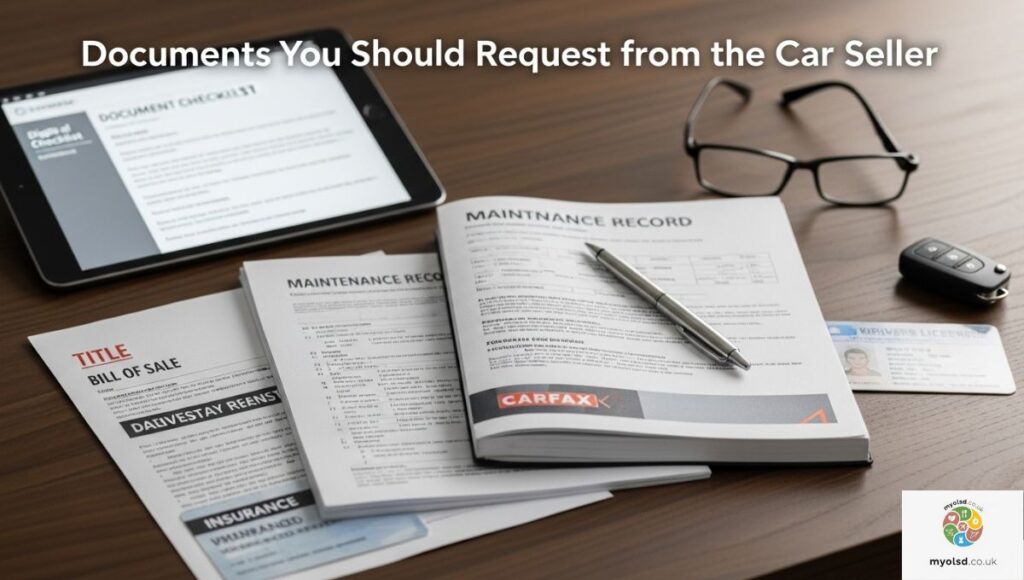
If you’re buying privately or a used car, always request:
- V5C logbook (with DVL watermark)
- Service history and garage records
- MOT certificate
- Proof of purchase receipt
- Seller’s details matching the VIN and logbook
These documents confirm ownership authenticity and help you spot any red flags like a stolen vehicle or mileage discrepancies. You can also use free tools like a MOT check tool or VIN verification service to validate a car’s history.
Final Thoughts
Buying a car becomes much easier when you know exactly what’s needed. From your driver’s license to your proof of insurance, being prepared helps you avoid headaches, speed up paperwork, and get behind the wheel faster.
Whether you’re purchasing from a dealership, trading in, or buying used, this checklist ensures you’re ready for every step. So next time you wonder what to bring when buying a car, remember preparation is the key to driving home happy.
FAQs
What to bring when picking up a car?
Bring your driver’s license, proof of insurance, payment documents, and any financing or trade-in paperwork. These items ensure a smooth handover and help you complete registration on the spot.
What is the most important thing when you buy a car?
The most important thing is preparation having all required documents like ID, insurance, and proof of income ready before visiting the dealership. It saves time and prevents delays in the buying process.
What do I need to take when getting a new car?
Take your driver’s license, proof of residence, insurance card, and payment method or loan approval letter. If you’re trading in, bring your old vehicle’s title and registration too.
What’s the best thing to do when buying a car?
Research ahead of time, set a clear budget, and compare financing options. Always double-check your documents and ask questions before signing anything at the dealership.
What is the best rule for buying a car?
The best rule is never rush. Take time to review every document, understand the total cost, and ensure the deal fits your financial comfort zone.
What is the smartest way to buy a car?
The smartest way is to get pre-approved financing, know your trade-in value, and bring all required documents. This gives you negotiating power and helps secure the best possible deal.
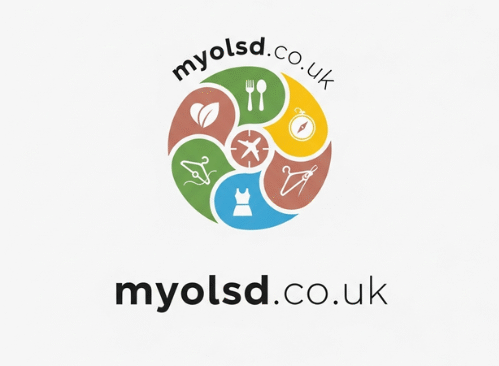
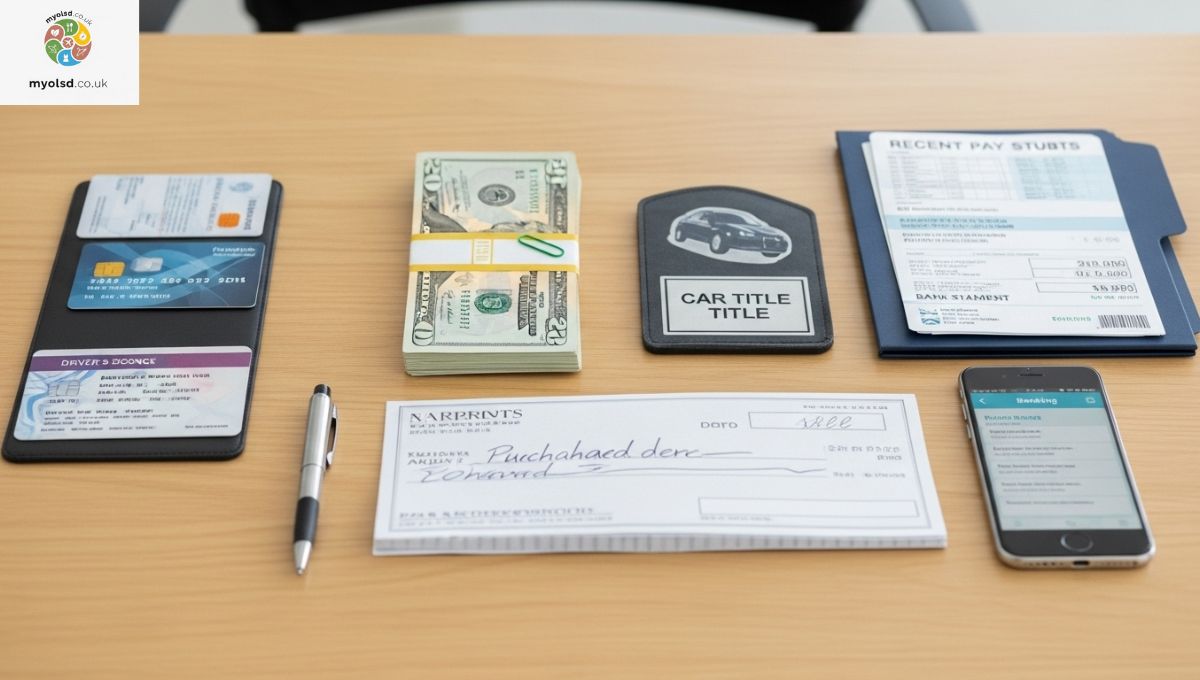
1 thought on “What to Bring When Buying a Car: The Complete Checklist for Every Buyer”